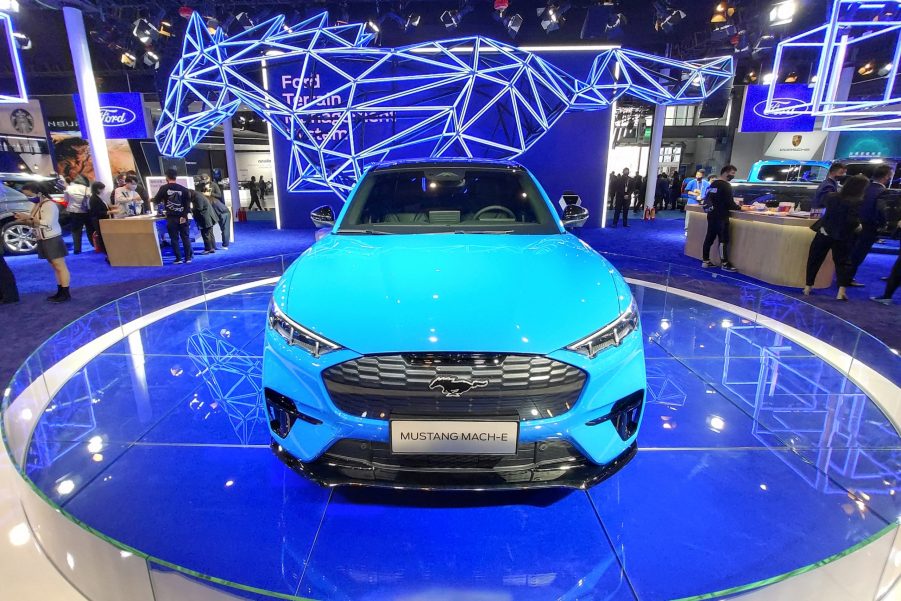
Ford’s EV Battery Supplier Could Be Kicked Out of the U.S.
Recently, a headline regarding a major electric vehicle battery supplier is getting traction. There are some sticky allegations that might result in a U.S. production jam. This news carries weight among Ford enthusiasts who are eagerly anticipating the blue oval’s EV introductions. The supplier potentially getting kicked out of the U.S. is Ford’s EV battery vendor, and it could impact how soon consumers get to see a Ford EV vehicle.
The SK Innovation allegations
SK Innovation, Ford’s supplier, may be in some hot water because of potentially misappropriating trade secrets. Reuters reported this month that the U.S. International Trade Commission agreed with the existing claim by SK Innovation competitor LG Chem Ltd. regarding the misappropriations. As a result, the ITC issued a limited 10-year exclusion order, translating to a ban on importing some lithium-ion batteries.
What a ban would mean for the company
While the SK Innovation ban prohibits the company from importing its batteries, there is a silver lining. The company already has one production facility in the U.S., and this Georgia-based location will be permitted to continue producing its lithium-ion batteries for Ford and Volkswagen. Ford’s EV F-150 program parts production will continue for four years, and Volkswagen’s MEB electric line production will continue for the next two years. The ITC also outlined permissions for SK Innovation to continue replacing and repairing batteries already in Kia vehicles here in the states.
How Ford and Volkswagen plan to adjust
The ITC also extended comments to allow automakers already in partnership with SK Innovation more time to transition to new vendors. This hopefully means Ford and Volkswagen both will have time to continue using the SK Innovation batteries until new supplier agreements can be executed. And new supplier contracts might not need to be pursued.
MotorTrend reported President Joe Biden has a 60-day review period with the ability to reverse the ban. And if the accusing rival company and SK Innovation can arrive at some settlement agreement, the ITC may drop the case altogether.
Is the EV lineup still underway?
What does all this mean for consumers? The good news for Ford and EV enthusiasts is that even if the ban should stand permanently, the electric vehicle commitments from both Ford and Volkswagen don’t expect to miss a beat. And those commitments are big. Ford announced its plans for 17 electric vehicles in Europe alone by 2024. Prototypes and designs launched in Frankfurt, Germany in 2019 included an all-new Kuga Plug-In Hybrid, an Explorer Plug-In Hybrid, a new Tourneo Custom Plug-In Hybrid, and the new Puma EcoBoost Hybrid. And Ford’s new Mustang Mach-E is already on deck. Ford’s official statement indicates the automaker doesn’t plan to waiver from its timeline to deliver the all-electric Ford F-150 to market in 2022.
Volkswagen’s roster of up-and-coming EVs includes the I.D. compact04 and the I.D. CROZZ04 SUV. VW plans on launching its zero-emission I.D. BUZZ04 van in 2022. VW’s production facility is located in Chattanooga, TN. And the company’s official statement revealed it wouldn’t be making any commitment changes to produce its upcoming EVs for the U.S. market, either.
The ITC takes misappropriations of trade secrets very seriously. And this latest round of allegations against SK Innovation just reminds consumers that there are suppliers behind the scenes contributing to the timelines of new vehicles. In this case, it sounds like Ford and VW won’t feel the sting of the potential 10-year ban on lithium-ion batteries. Whether the allegations are dropped, or the automakers find new suppliers, consumers can rest assured their exciting new EVs will still be coming to a dealer near you.


